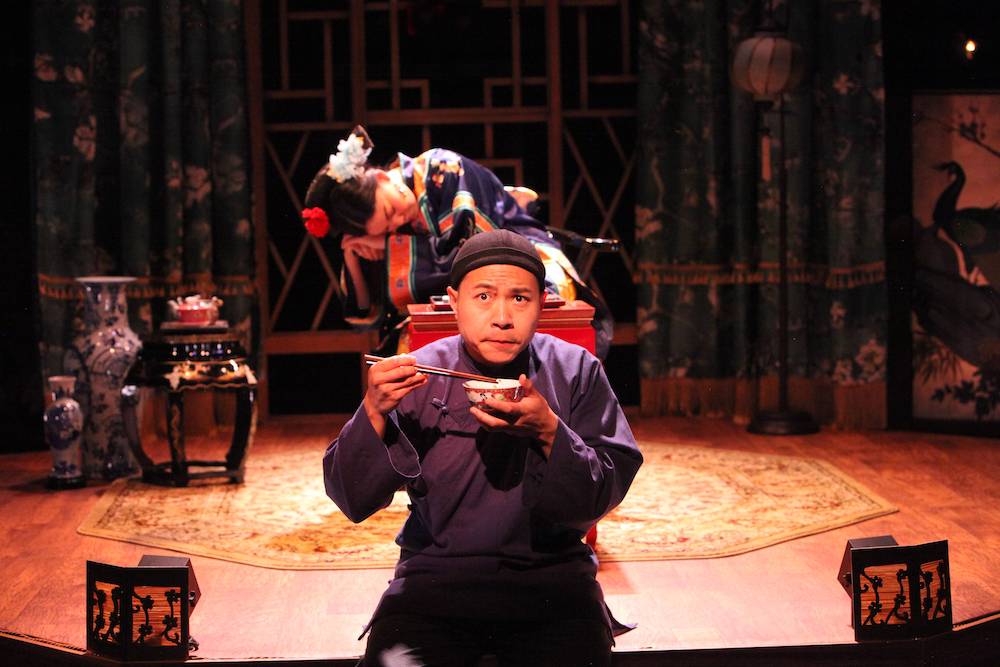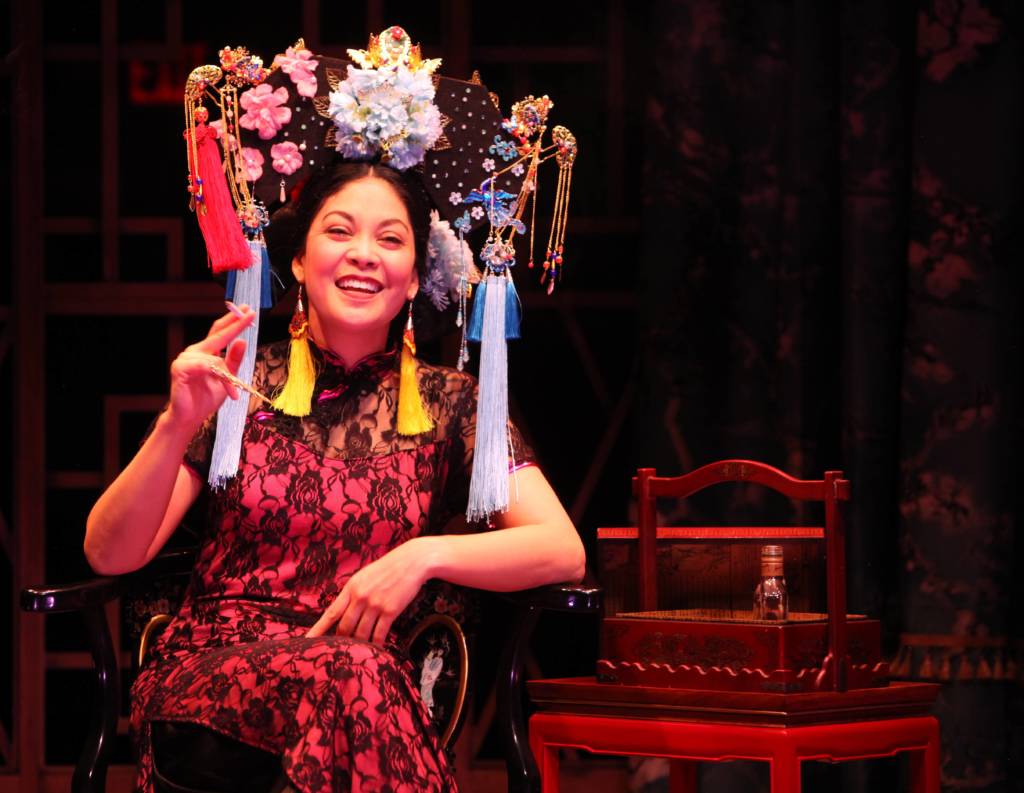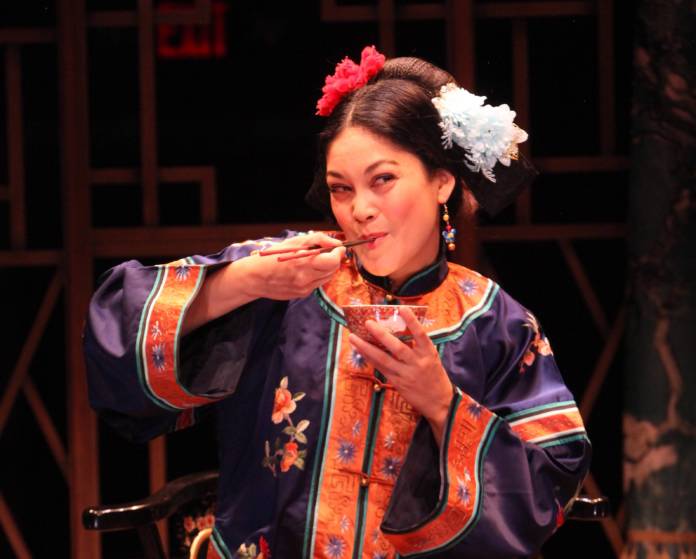Even as the audience files in, we are already part of the play, or rather, the exhibition. Atung (Will Dao) sits in front of an elaborate brocade curtain lit with dusty Chinese lanterns. He stares out at us, as if we are on display. At times he smiles, as if he has overheard something amusing. Are we to smile back? Ignore him? He knows what awaits us behind the cloth, and he seems to relish the moment that he pulls on a long rope to raise the curtain, revealing the story that lies hidden inside.
It is a true story, but one that most Americans have never heard.
The Magic Theatre has selected playwright Lloyd Suh’s The Chinese Lady (through November 3) to open its 53rd season: Directed by Mina Morita, the drama focuses on Afong Moy, the first Chinese woman to be brought to the United States in 1834 and exhibited for profit by the merchants Nathaniel and Frederick Carne.
The Carnes were banking on Americans’ fascination with the exoticism of China. And as the curtain goes up, Jacquelyn Scott’s set perfectly captures that illusion with painted screens of storks and lotuses, enamel tables, and Ming Dynasty vases—the trappings of Chinoiserie designed to mimic Westerners’ preconceptions.
Seated in an elegant pose in the middle of the stage is Afong Moy (Rinabeth Apostol), dressed in ornate embroidered silks of purple and gold, her hands folded demurely in her lap.
From the very start, Afong Moy tells the audience that the setting is deceptive: “My entire life is a performance. These words you hear are not my own. These clothes that I wear are not my own. This body that I occupy is not my own. The Room in which I am seated is intended to be representative of China, just as I am intended to be representative of the Chinese Lady: the first woman from the Orient ever to set foot in America, yet this Room is unlike any room in China, and I am unlike any lady to ever live.
“I shall assume that you have paid your 25 cents, 10 cents for children, because you are curious about China. I understand it is my duty to show you things that are exotic and foreign and unusual.”

Apostol’s range is astonishing. When we first meet her, she explains like a bubbly teenager that she is 14 years old and newly arrived in America. She seems to delight in her silken clothes, her elaborate hairdo, and center stage seat. She admonishes Atung, her translator and manager, as “irrelevant,” She eats her shrimp and rice with delicacy, explaining how graceful chopsticks are, and sips tea ”in a ritualistic way to demonstrate its importance in my culture.” She slowly circumambulates the Room, while placidly describing in excruciating detail how her feet were broken and bound when she was four years old.
Perhaps sensing the audience’s discomfort, she notes calmly that most Americans consider the practice barbaric. Then she pauses and says, “I have noticed that there are traditions in the American identity that are similarly entrenched, despite some controversy about them among the populace. Such as corsets. Or the Transatlantic Slave Trade.”
We watch this graceful, clever teenager grow up as the Carnes display her around the country. She is giddy about her adventurous dip in the Susquehanna River (a dip, Atung comments wryly, that led to pneumonia and two canceled performances), muses on the hidden meaning of the crack in the Liberty Bell, and is moved to introspection by a visit to the Cincinnati zoo. “If I am in a cage, what sort of animal am I? Times I feel I am a swan or a peacock, with adornments to be admired. Times I feel I am an ox or a donkey or some other beast of burden….But I am none of these things, am I? I am a human being.”
The highlight of her tour is a meeting with “Emperor Jackson” at the White House in 1837. Afong Moy has grand aspirations of being a link for friendship between the people of China and the people of the United States, even a beacon of hope for world peace. She speaks eloquently about her admiration for America and hopes for “a deeper more lasting intimacy.”
But Atung’s translation of her words into bland anodynes betrays her optimism and innocence. Here, the tables are turned and he is the relevant one.
Atung tells her “the act of translation is more like… interpretation than direct recreation.” She suspects Atung is not translating accurately but—perhaps because she hopes it is so—persists in thinking that she has really made a connection to Jackson. As they reenact the scene of the meeting, Atung’s portrayal of Jackson is both hilarious and chilling, clearly revealing the President’s arrogance, racism and obscene obsession with Afong Moy’s tiny bound feet.
As the years go by, she is still stuck her phony Chinese Room, not knowing how long she will be there and if she will ever see her family in China again. Her exhibit has been sold to P.T. Barnum. She has shed her elaborate dynastic brocades for a slinky red and black cheongsam, drinks whiskey instead of tea, and smokes. She explains that her English is improving “so what you are hearing me say is perhaps closer to what I truly sound like.”
Apostol slowly reveals Moy’s growing awareness of her isolation and how she is being used. Her relationship with Atung has grown more honest and warm. She has different ideas now, such as bringing a white girl to China and putting her on display there so the Chinese can see how Americans eat with a fork.

Apostol is believable at every age, from naïve 14-year-old to an increasingly savvy—and bitter—middle-aged woman. When some news from P.T. Barnum threatens her relationship with Atung, the only meaningful one she has, it shakes her to her core.
On opening night, Artistic Director Loretta Greco spoke of the Magic Theatre’s long creative relationship with playwright Suh. His earlier plays, American Hwangap and Jesus in India were performed at the Magic at Greco’s invitation, and the first pages of The Chinese Lady were written and read by two actors during Magic’s Virgin Play Festival in 2015. “One of the joys of being a part of Magic is to experience playwrights over time, as their singular lens on the world sharpens,” Greco said.
Putting “exotic” people on display in the West was not just the practice of the Carne Brothers or P.T. Barnum. Before Afong Moy, Sarah Baartman, the so-called “Hottentot Venus” was transported from South Africa to Europe in 1810. After Moy, Igorot tribespeople from the northern Philippines were exhibited dancing in loincloths and eating dogs at the World’s Fair in St. Louis in 1904. In The Chinese Lady, Suh brings this horrific colonialist practice to light, imagining the inner life of a human who was put on display in a strange country for the pleasure of curiosity-seeking onlookers.
Thanks to Suh’s “exhibition,” when Atung raises the brocade curtain on the Room, Apostol’s captivating performance reveals a chapter of our country’s hidden history that we cannot look away from.
THE CHINESE LADY
Through November 3
Magic Theatre, SF.
Tickets and more info here.







